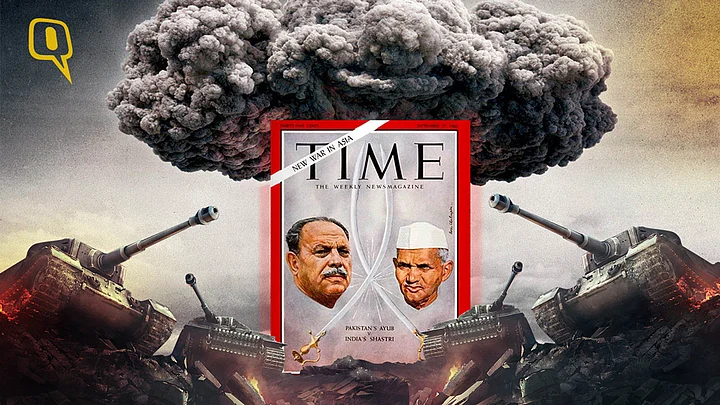2021 marks the 56th anniversary of the 1965 war that both India and Pakistan claim to have won. The truth perhaps, lies somewhere in between the chest thumping.
April 9, 1965: India and Pakistan border patrols enter into a skirmish in the Rann of Kutch. Pakistan claims Indian troops opened fire in a bid to dislodge them from their posts. India on the other hand claims Pakistani troops mounted a heavy attack on their Sardar Post.
A ceasefire agreement signed on June 30, 1965 was aimed at defusing the tension along Gujarat.
August 25, 1965: BBC reported that Pakistani soldiers had launched a covert operation and entered Indian-administered Jammu & Kashmir. Till date, there is zero clarity on how many men were part of Pakistan’s “Operation Gibraltar”. Multiple reports indicate the number could’ve been anywhere between 5,000 to 30,000.
Pakistan rationalized this covert operation by claiming it was meant to “liberate” the people of Kashmir.
Liberators or Insurgents?
Christine Fair who was in the news recently for singing to an auto-wala and forcing him to charge by the meter, is an expert in South-Asian political-military affairs. In her book “Fighting to the End: The Pakistan Army’s Way of War”, she quotes the Pakistan Army Chief General Muhammad Musa’s description of Operation Gibraltar.
(It) envisaged, on a short-term basis, sabotage of military targets, disruption of communications, etc. and as a long-term measure, distribution of arms to the people of occupied Kashmir and initiation of a guerrilla movement there with a view to starting an uprising in the Valley eventually.
This, as a general rule, is seen by India as an act of aggression.
Dead On Arrival Covert Operation
Brigadier (retd) Shaukat Qadir who served in the Pakistan Air Force has written a four-part analysis of the war. He says Pakistan President Ayub Khan may have been compelled by Foreign Minister Zulfiqar Ali Bhutto to sanction Operation Gibraltar, against better judgement, because he had lost a lot of political ground.
Pakistan went into Operation Gibraltar without any preliminary preparations and undertook a guerrilla operation inside Indian held Kashmir with a large number of regular soldiers, some SSG elements and a smattering of irregulars, expecting to be welcomed by the local population and raise them up in arms against the Indian government. They were destined to be rudely disillusioned.
– Brigadier (Retd) Shaukat Qadir
“Far from rising up in arms”, he adds “the local population denied any support and, in many instances handed over the infiltrators to Indian troops”
Considering this Operation Gibraltar was technically off the books, Pakistan had initially even refused to accept the bodies of its slain soldiers.
Pakistan Army’s Finest Moment?
September 1, 1965: With its covert operation having failed miserably, Pakistan launched Operation Grand Slam in the Chamb sector of Akhnoor. Regarded as the finest example of an offensive battle in the Indo-Pak context, the Battle of Chamb provided a huge morale booster to the Pakistan Army.
Pakistan had, to begin with, a clear advantage over India. It had the element of surprise combined with numerical and technically superior equipment. There is little debate over Pakistan’s victory over Chamb which forced the Indian Army to retreat.
Indian Army’s March to Lahore
September 6, 1965: Unable to put up a resistance in Akhnoor, the Indian leadership headed by Prime Minister Lal Bahadur Shastri made the bold move of invading West Pakistan.
BBC reported that Indian troops had crossed into West Pakistan, “crossing the border at three points in an attack which appears to be aimed mainly at the city of Lahore”.
There have been reports of the Indian Air Force in action, striking against military targets, including an oil tanker train, a group of military vehicles, a goods train carrying supplies, an army camp and some gun positions.
The BBC report also quotes an Indian government spokesman as saying:
Our policy is that when Pakistan has bases from which it is mounting attacks on our territory we have to destroy those bases.
India’s ‘Asal Uttar’
September 8-10, 1965: While Pakistan maintains that the Battle at Khemkaran was indecisive, the fact is, had India lost the biggest tank battle after World War II, New Delhi would’ve been a day’s drive for the Pakistan Army. India believes it gave a “fitting reply” to the Pakistani Army and the tank cemetery or “Patton Nagar” is a testimony to India’s victory in Khemkaran.
Ceasefire
September 22, 1965: The United Nations brokered a ceasefire agreement that ended the war with both sides holding some of the other’s territory.
So, Was There a Winner?
Speaking to The Quint, Brigadier (retd) Chittaranjan Sawant says who won and who lost should be determined by two factors: what was the aggressor’s aim and what did he achieve?
Pakistan wanted Kashmir. Did they achieve? The answer is a big NO. But India was able to defend its territory against Pakistan’s offensive.
To know how Pakistan and Indian textbooks differ in recounting history, click here.
(This article was originally published on 28 August 2017 and has been reposted from The Quint’s archives to commemorate 56 years of the 1965 Indo-Pak war.)
